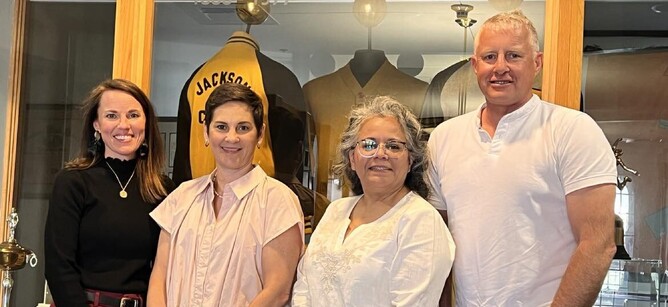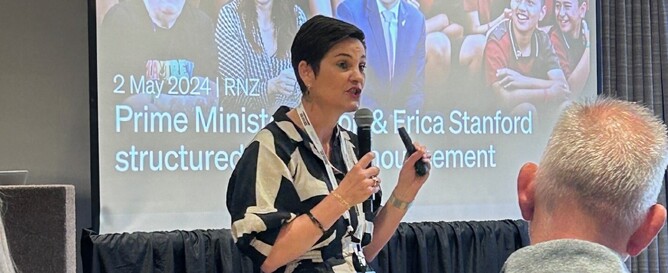As Dyslexia Awareness Month draws to a close, I reflect on a journey driven by learning, commitment, and the shared goal of literacy for all. Our dedication to dyslexia and literacy awareness pushes us to learn from leading researchers, practitioners, and advocates worldwide, bringing these insights home to consider how we continue to empower every child’s path to literacy.
Over the course of October (aka Dyslexia Awareness Month), I had the privilege of connecting with and engaging numerous experts whose contributions have profoundly shaped the global literacy landscape. Their message was one of hope, equity, and action: literacy outcomes must not be determined by postcode, race, or family background. Achieving this requires a foundation built on evidence-based practices, collaboration, and the will to act.
Dr. Reid Lyon and Margaret Goldberg at the International Dyslexia Conference 2024
Dr. Reid Lyon shared insights that deeply resonated with me. Reflecting on past challenges, Dr. Lyon noted, “You cannot ask anyone to change things unless they are part of the process.” His words call for collaboration at every level—policy, research, and classroom practice—to drive literacy improvement. His reflections remind us that progress is possible, but only if we actively bridge the gap between policy and the classroom. As Dr. Lyon emphasised, “Policy is the first step, but implementation is key.”
Mississippi’s literacy success over the past decade stands as proof that with coordinated effort, rapid change is achievable. However, they too admit that they are continuously reviewing and refining their implementation. In New Zealand, a crucial gap remains in our implementation strategy, centred on a critical element that some may find challenging: data. Without national data on achievement rates or specific progress tracking for our dyslexic and other learners, we risk mismatched and inconsistent implementation efforts. This isn’t about reigniting past debates but recognising a key component highlighted in every state we discussed large-scale implementation with. We must find a way to move beyond the heartache and bruises left by past national standards to truly progress as a sector. Without data, we can never have an accurate, full picture of literacy rates, achievement, and areas of need in Aotearoa. To say we are implementing a Structured Literacy approach with fidelity means we will have a screening, diagnostic and progress monitoring system in place, as well as quality data analysis and reporting functions.
Carla and Greg McNeil with the Mississippi Department of Education Team
A central theme at the IDA conference was the importance of Structured Literacy as a complete approach across Tiers 1, 2, and 3. Many experts spoke extensively about the need for a comprehensive system where all tiers are effectively aligned and implemented, ensuring that no student is left without the support they need. Tier 3 instruction, especially, requires teachers with expert knowledge and specialised skills to provide targeted intervention. We must ensure that New Zealand teachers and schools are fully equipped to deliver Structured Literacy at all levels of instruction; only then will every learner be served. It was a privilege to share a part of New Zealand’s implementation journey in Dallas, emphasising our unique context and the importance of leadership in fostering change.
Learning also means being open to robust discussions about research and practice. We were reminded that while perspectives in the field may differ, it’s okay when the experts don’t agree on every detail. What truly matters is aligning our practices with fundamental principles that have demonstrated effectiveness and positive outcomes for learners. This approach keeps us grounded, focused on outcomes, and always willing to adapt and refine.
New Zealand is at an important crossroads in education, where evidence-based approaches like Structured Literacy hold the promise to reshape learning outcomes for all. I am so proud of the work our team is doing, and I want to thank them for their hard work and dedication in this space. Please know that you make a difference each and every day. It takes a village, and what a village we have here at Learning MATTERS.
Carla McNeil at the International Dyslexia Conference 2024
This month, we posed the question, “What’s Your Story?” But as we close, we ask, “What will your story be in five years?” If we act now, committing to evidence-based strategies and a united effort, what could we achieve together? We have to plan for the story; we must be prepared and strategic because implementation and leadership is crucial to long-term success and sustainability. We must challenge practices that don’t align with what we know works, break down silos, and create a future where literacy is within reach for every child.
We may not have all the answers yet, but we certainly know enough to act. With compassion, collaboration, and a foundation built on evidence and shared purpose, we can ensure that every child in New Zealand becomes a confident, capable reader.






